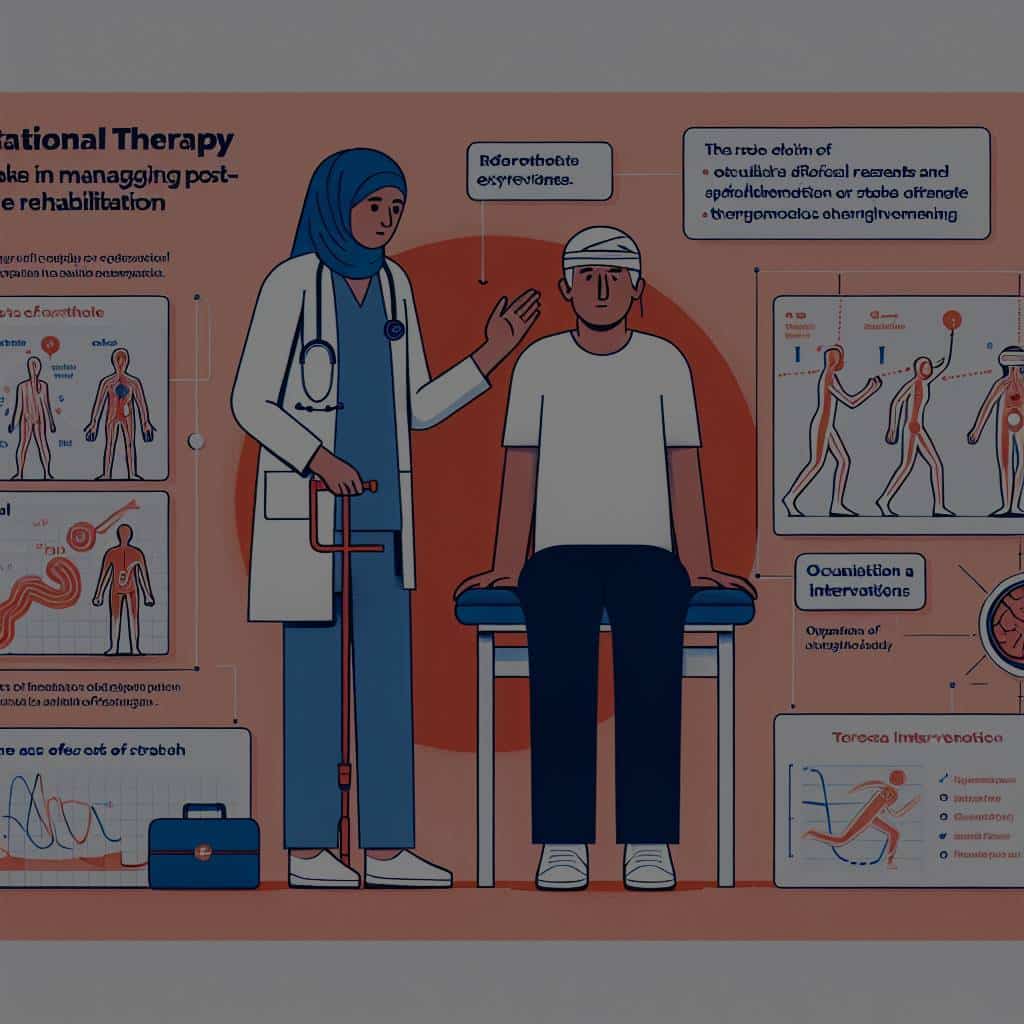What Is the Role of Occupational Therapy in Managing Post-Stroke Rehabilitation?

Dealing with a stroke involves far more than simply recovering from the physical event. It also involves learning how to live again. After a stroke, ‘normal’ takes on a different meaning. This is where occupational therapists step in, providing the necessary services and care needed to help stroke survivors regain their independence. This article will delve into the critical role that occupational therapy plays in post-stroke rehabilitation.
Understanding Occupational Therapy and Its Role in Stroke Rehabilitation
Occupational therapy is a health care service aimed at helping individuals regain their daily functioning skills after a debilitating incident like a stroke. Therapists focus on enabling patients to perform regular activities, from self-care tasks like eating and dressing to more complex actions like cooking or using a computer.
Also read : How Does the Use of Blue Light Filtering Glasses Impact Sleep Quality in Adolescents?
The role of an occupational therapist in stroke rehabilitation is profound and multifaceted. Drawing on their specialized knowledge of the effect of illness on personal and social daily activities, they design a customized rehabilitation plan for every patient. This plan aims to restore the patient’s abilities to perform everyday tasks, thereby improving their quality of life and fostering independence.
How Occupational Therapists Assess and Plan Stroke Rehabilitation
The first step for occupational therapists in stroke rehabilitation is to conduct a comprehensive assessment. This involves evaluating the patient’s physical health, cognitive abilities, and their skill in performing daily tasks. It also encompasses an evaluation of the patient’s living environment to identify potential barriers to their independence.
Topic to read : How to Optimize Vitamin D Absorption for Bone Health in Cloudy Climates?
Occupational therapists use valid and reliable assessment tools to gather this information. One such resource is PubMed, a database of references and articles in the field of life sciences and biomedical topics. It provides necessary insight into the latest research and evidence-based practices in stroke rehabilitation.
Based on the assessment, therapists will create a personalized therapy plan. This plan includes a set of goals linked to the activities that the patient finds challenging. These goals are generally simple, practical, and geared towards improving the patient’s ability to conduct daily tasks independently.
Specific Services and Activities Provided by Occupational Therapists
Occupational therapists provide a wide range of services and activities designed to help stroke patients rebuild their skills and regain their independence. These activities are tailored to the individual’s specific needs and may include:
- Therapeutic activities to improve muscle strength, coordination, and balance.
- Cognitive exercises to enhance memory, problem-solving, and other mental functions.
- Training in the use of adaptive equipment, such as wheelchairs, walkers, or specialized utensils for eating.
- Environmental modification advice, including recommending changes in the home or workplace to make them safer and more accessible.
An essential part of occupational therapy is ongoing evaluation and adjustment of the therapy plan. As the patient’s abilities and needs change, so too will the therapy.
The Impact of Occupational Therapy on Stroke Survivors’ Lives
The impact of occupational therapy on the lives of stroke survivors is immense. By focusing on practical, day-to-day skills, occupational therapists help patients regain their independence, dignity, and confidence.
A study in the American Journal of Occupational Therapy found that stroke survivors who participated in occupational therapy programs were significantly more likely to maintain or improve their abilities in performing daily activities than those who did not.
Another study published in PubMed noted that stroke survivors who received occupational therapy services experienced improved quality of life, better social integration, and reduced caregiver burden.
In Conclusion: The Unquestionable Value of Occupational Therapy in Post-Stroke Rehabilitation
Occupational therapy plays an essential role in stroke rehabilitation. It drives stroke survivors towards independence by helping them regain the skills needed to perform daily tasks. By focusing on the individual’s abilities and goals, occupational therapists effectively cater to each patient’s unique needs, thus significantly improving their quality of life. Indeed, the unquestionable value of occupational therapy in post-stroke rehabilitation makes it an indispensable part of the healthcare system.
Role of Occupational Therapy in Long-Term Stroke Recovery
The long-term journey toward stroke recovery can often be challenging and complex. It is during this phase where the value of occupational therapy is truly realized. Occupational therapists not only aid patients in the initial stages of recovery but also provide crucial support throughout their journey, implementing strategies that enable the long-term management of the stroke’s aftermath.
Occupational therapists apply a patient-centered approach to the rehabilitation process, focusing on enhancing the patient’s quality of life by enabling them to perform daily activities independently. This often involves relearning old skills or acquiring new ones that compensate for any loss of function due to the stroke.
To address upper limb dysfunction, a common complication following a stroke, therapists might use techniques like electrical stimulation to help regain muscular strength and coordination. Cognitive rehabilitation exercises also form a crucial part of the therapy, helping patients regain cognitive abilities that may have been affected by the stroke.
Furthermore, occupational therapists also offer expert advice on adapting to changes in the home or workplace environment, assisting in identifying and eliminating potential safety hazards and barriers to independence. This can include suggesting modifications like installing ramps or grab bars, or recommending assistive devices that can ease the process of daily living.
Another critical aspect of long-term stroke rehabilitation is the emotional and psychological support that occupational therapy provides. The process of recovery often elicits feelings of frustration, anxiety, and depression in patients. Occupational therapists, as part of the health care team, help patients navigate these emotions and adapt to the changed circumstances of life after a stroke.
Occupational Therapy: A Cornerstone of Post-Stroke Rehabilitation
Occupational therapy, with its unique focus on improving the daily living skills of patients, plays a pivotal role in post-stroke rehabilitation. By fostering independence and enhancing the quality of life, occupational therapists not only assist stroke survivors in physical recovery but also empower them to regain their place in society.
Studies have consistently demonstrated the positive impact of occupational therapy on stroke recovery. Patients who undergo this form of therapy show improved functionality in daily activities, higher levels of independence, and a better overall quality of life.
Moreover, occupational therapy also eases the burden on caregivers. With the therapist’s guidance, caregivers learn to support stroke survivors effectively, fostering their independence while ensuring their safety and well-being.
In conclusion, the role of occupational therapy in stroke rehabilitation is not only beneficial but also indispensable. With its patient-centered approach, it provides an effective pathway to regain independence and a meaningful life post-stroke, proving its unquestionable value in the healthcare landscape. By addressing the physical, cognitive, and emotional needs of stroke survivors, occupational therapists enable them to navigate the challenging path of recovery, making a significant contribution to their long-term well-being.
